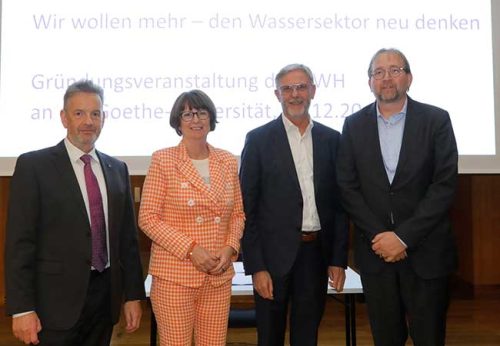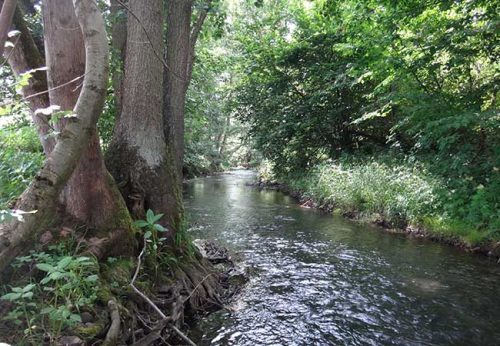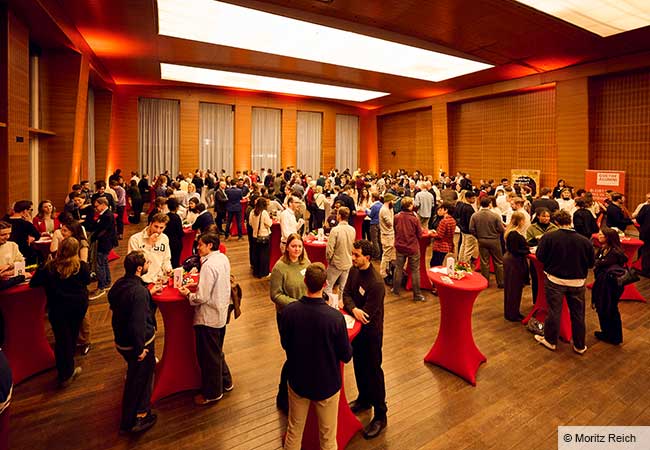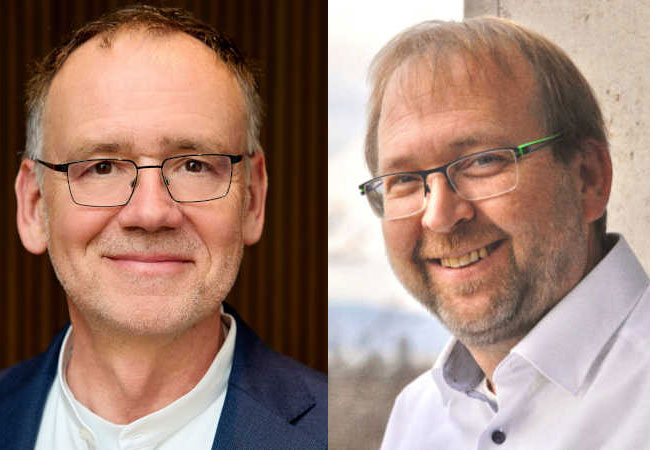The federal state of Hesse’s water industry is facing major challenges when it comes to sustainably ensuring the secure supply of water for both the population as well as companies. Many of these challenges are the result of climate change. On December 11, 2023, Hessian Environment Minister Priska Hinz officially inaugurated the new Hesse Water Competence Center (Kompetenzzentrum Wasser Hessen, KWH) at Goethe University Frankfurt. The center, which brings together stakeholders from science and education, public administration, politics and the water industry, aspires to tackle problems at system level, speed up the transfer of scientific findings into water management practice, and expand the range of educational opportunities.

There are several profound transformations facing Hesse’s water sector: Increasingly frequent extreme weather events caused by climate change are exerting rising pressure on water resources and water ecosystems, leading in turn to a loss of biodiversity. Nothing made the consequences for people and nature clearer than the drought summers of recent years. At the same time, there has been an increase in heavy rainfall events, with resulting damage to buildings and infrastructure. Demographic change also constitutes a challenge for water management: While growing urban populations will have an increasing demand for water in the coming years, the population decline in rural areas will result in rising costs for the provision of sufficient water and wastewater infrastructure. Already today, the entry of trace substances – for example from pharmaceuticals – into wastewater is causing problems in its treatment and in drinking water purification.
Given these challenges and the associated trade-off between the protection and the use of water resources, innovative and sustainable implementation solutions must be sought and found for the many stakeholders involved. Addressing these challenges, the federal state of Hesse has now set up the Hesse Water Competence Center KWH, strengthening interdisciplinary cooperation between science, public administration, politics, practice and education. KWH will bundle the expertise of and encourage cooperation among its members, which include the Hessian Ministry of Environment, Climate Protection, Agriculture and Consumer Protection, the Hessian Agency for Nature Conservation, Environment and Geology, the regional councils, all Hessian universities, many Hessian institutions of higher education, as well as the Senckenberg – Leibniz Institution for Biodiversity and Earth System Research (SGN) and the Institute for Social-Ecological Research (ISOE).
Environment Minister Priska Hinz explains: „With the Climate Plan Hessen and the Water Plan for the Future, we have set the course for the sustainable protection and integrated management of Hesse’s water resources. The Hesse Water Competence Center will support us in implementing the necessary climate change-related adaptations, by taking into account the latest scientific findings as well as innovative solutions.“
Professor Thomas Schmid, President of the Hessian Agency for Nature Conservation, Environment and Geology, is certain: „Now that KWH bundles the different and very comprehensive expertise in Hesse’s water sector, it is much easier for scientific findings to contribute to the practical development of concrete solutions that ensure the sustainable use of water as a resource.“
Professor Enrico Schleiff, President of Goethe University Frankfurt, which played a key role in KWH’s establishment, explains: „We must succeed in creating ‚win-win situations‘ that preserve water resources and protect aquatic biodiversity on the one hand, and at the same time also safeguard the water needs of both the population and the economy. Research carried out at Hessian universities and institutions of higher learning will contribute to achieving this goal.“ According to Schleiff, universities and colleges can also help when it comes to recruiting the right specialists: „We are constantly working on new teaching and training concepts and further developing existing ones – all with a view towards qualifying experts for nature conservation and water management.“ He is not only in favor of involving partner institutions active in the field as well as the authorities in courses offered at different university faculties or other institutions of higher learning. In addition, Schleiff is also a proponent of awarding external theses, for example: „This would allow us to generate added value from a scientific perspective as well.“
Schleiff is delighted about KWH’s launch at his university: „Water research has been an integral and important part of Goethe University Frankfurt’s research portfolio for many years. Together with our colleagues from other universities, institutions of higher learning and non-university research institutions in Hesse, we see it as our responsibility to advance KWH’s objectives and deliver a contribution to the conservation and sustainable use of water resources in Hesse.“
KWH sets out to develop practical, scientifically sound, evidence-based and innovative solutions to meet the challenges in the water sector. Instead of addressing individual hydrological, ecological and technical-engineering issues, within KWH, the urgent problems relating to the processes and dynamics of water resource management can be addressed in an interdisciplinary and integrated approach. Thanks to this comprehensive cooperation, social, economic and political aspects – which constitute further important fields of action in water management – can also be taken into account.
Pooling Hesse’s water expertise in such a manner opens up new perspectives for the implementation of applied research projects on topics relevant to the sustainable use of water resources in Hesse, including the transfer of required skills, as well as policy advice.

About the Hesse Water Competence Center (Kompetenzzentrum Wasser Hessen, KWH)
The Hesse Water Competence Center acts as a link between actors in the water sector, which range from science, public administration, politics, and education all the way to water management practice. In addition, KWH will also cooperate with associated partners, including non-governmental organizations, associations or companies active in the water sector. A cooperation agreement regulates the future collaboration between the institutional partners:
1. Hessian Ministry of Environment, Climate Protection, Agriculture and Consumer Protection
2. Hessian Agency for Nature Conservation, Environment and Geology
3. Darmstadt Regional Authority (Regierungspräsidium)
4. Gießen Regional Authority (Regierungspräsidium)
5. Kassel Regional Authority (Regierungspräsidium)
6. Goethe University Frankfurt
7. Justus Liebig University Giessen
8. Philipps-Universität Marburg
9. Technical University of Darmstadt
10. University of Kassel
11. Hochschule Darmstadt
12. Hochschule Fresenius
13. Hochschule Geisenheim University
14. RhineMain University of Applied Sciences
15. Technische Hochschule Mittelhessen
16. Senckenberg – Leibniz Institution for Biodiversity and Earth System Research (SGN)
17. Institute for Social-Ecological Research (ISOE)







